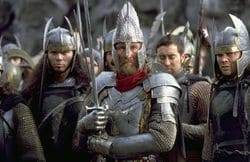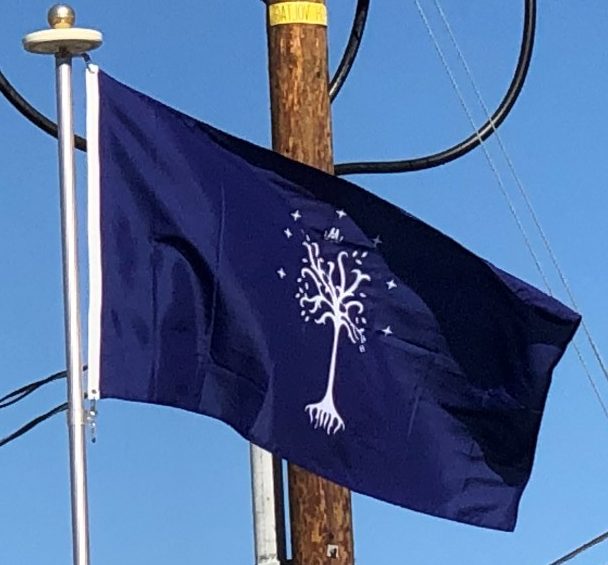Introduction:
Gondor was the prominent kingdom of Men in Middle-earth, bordered by Rohan to the north, Harad to the south, the cape of Andrast and the Sea to the west, and Mordor to the east. Its first capital was Osgiliath, moved to Minas Tirith in TA 1640. The city of Minas Tirith remained the capital of Gondor for the rest of the Third Age and into years of the Fourth Age; other major fortresses included Dol Amroth in Belfalas and Osgiliath, which was a city on the Anduin.
Gondor was founded by the brothers Isildur and Anárion, exiles from Númenor. Gondor was an allied kingdom with Arnor, whose line of king chieftains came from Isildur, while the Line of the Kings of Gondor was from Anárion. Gondor was at the height of its power in its early years due to the ships and the military might that its armies possessed. However, continued attacks by allies of Sauron, civil war, and a devastating plague caused it to gradually decline over the course of the Third Age until Sauron’s final defeat and the crowning of Aragorn II Elessar. Following that time the power of Gondor once again expanded, until the former lands of Arnor were brought under the banner of the Reunited Kingdom.
In all, there were thirty-one kings of Gondor after Anárion, who was slain before Barad-dûr at the Siege of Barad-dûr.

History:
Like Arnor to the north, Gondor was a Mannish kingdom founded by Anárion, the youngest son of Elendil, after the Downfall of Númenor. It was located to the South of Rohan and to the West of Mordor, on the Bay of Belfalas.
Early Years:
Before the Downfall of Númenor, Gondor was home to many Númenórean colonists, who either mixed blood with the indigenous Middle Men if they were friendly, or dispersed them into Ras Morthil, Dunland, and Drúadan Forest. Gondor, at a latitude comparable to Venice, was a more fertile region than Arnor to the north, and therefore it already had a larger population before the ships of Elendil’s sons arrived, including a well-established city, Pelargir.
The Faithful, or Elendili, from Númenor were given a warm reception upon their arrival by those that had already colonized Middle-earth, including a colonial branch of Númenorean royalty at Dor-en-Ernil. The colonists north of Anduin accepted Elendil’s claim to kingship over them. South of the Great River, however, the newly exiled Númenoreans did not recognize Elendil’s claim.
Gondor was being founded after Númenor’s population had already split between The Faithful and King’s Men, and all of the more southern colonies (such as Umbar) remained enemies of The Faithful.
The newly founded kingdom of Gondor was then part of the Last Alliance of Elves and Men which overthrew Sauron for the first time at the very end of the Second Age, and when Isildur cut the finger of Sauron.

Gondor Prospers:
After the war, Gondor’s power and wealth grew steadily (only interrupted by an Easterling invasion in TA 492). Its power would continue to grow into the 9th century Third Age. While the power of Gondor’s sister kingdom Arnor peaked during the 9th century, when it broke into various successor states, Gondor’s greatest glory was yet to come. Gondor’s great cities, Minas Anor, Minas Ithil, Osgiliath and Pelargir, only grew and the Dunedain of Gondor started to rule over more and more of the lesser people.
Gondor’s Golden Age:
Gondor’s power reached its Golden Age under the four “Ship-kings”:
- Tarannon Falastur r. TA 830 – TA 913. First of the Ship-Kings, died childless
- Eärnil I r. TA 913 – TA 936. Nephew of Tarannon
- Ciryandil r. TA 936 – TA 1015
- Hyarmendacil I (Ciryaher) r. TA 1015 – TA 1149. Last of the Ship-Kings.
In the reign of the powerful king, Hyarmendacil I (c. 12th century TA) Gondor reached the height of its power. During Hyarmendacil’s reign, Gondor’s borders reached their furthest extent. The Kingdom extended east to the Sea of Rhûn, south to the nearest lands of the Haradrim, as far north as Mirkwood, and west towards the borders of Arnor.
Such was Gondor’s wealth during the period that men from other lands would say in envy: “In Gondor precious stones are but pebbles for the children to play with.” Gondor would also enjoy several centuries of peace due to its military might.
